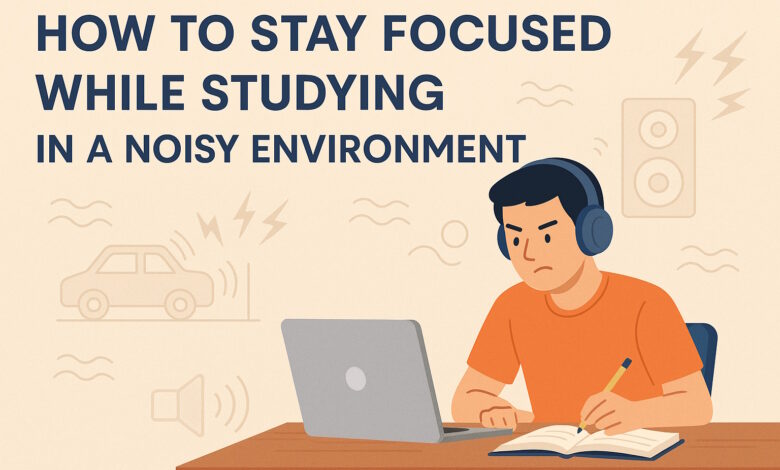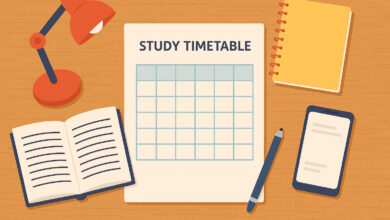How to Stay Focused While Studying in a Noisy Environment

In today’s fast-moving world, finding a quiet place to study is becoming more and more difficult—especially for Indian students living in busy cities, shared homes, or near roads full of honking vehicles. Whether you’re preparing for NEET, JEE, SSC, UPSC, or your school/college exams, staying focused while studying in a noisy environment is a real challenge.
But don’t worry! This article will guide you with simple and practical ways to concentrate better—even when your surroundings are noisy. Let’s explore scientifically backed strategies and helpful tools to boost your study performance in any situation.
Why Is It Hard to Study in a Noisy Environment?
Our brain is designed to notice sounds—especially sudden or loud noises. This is part of our survival instinct. But when you’re trying to focus, such distractions break your concentration, force you to restart the thought process, and make you feel mentally tired quickly.
Some common problems students face in noisy environments:
- Lack of focus
- Slow progress in reading or solving problems
- Headaches and stress
- Irritability and frustration
So, how can you fight this and still make the most of your study time?
10 Smart Tips to Stay Focused While Studying in a Noisy Environment
1. Use Noise-Canceling Headphones or Earplugs
Noise-canceling headphones are a smart investment if you live in a noisy neighborhood. They block background sounds and let you focus on your work. If you don’t want to spend too much, soft foam earplugs are a cheap and simple solution.
Pro Tip: Listen to instrumental music or white noise if total silence feels strange.
2. Create a “Study Bubble” Using Music
Instrumental music or ambient sounds can act as a sound barrier. Avoid songs with lyrics—they may distract you. Go for:
- Classical music (like Mozart or Beethoven)
- Lo-fi beats
- Rain or nature sounds (YouTube/Spotify have playlists)
- White noise apps (like Noisli or myNoise)
3. Use the Pomodoro Technique
This time management method boosts your focus and helps you avoid mental fatigue. Here’s how it works:
- Study for 25 minutes
- Take a 5-minute break
- After 4 cycles, take a 15–30-minute break
Why it works: It builds your attention span in short bursts, making it easier to ignore distractions.
4. Create a Study-Only Space
Train your brain to associate a specific place with studying—even if it’s a corner of your bed or table. Keep it clean, remove distractions (like your phone), and decorate it with motivational quotes or charts.
If possible, try not to study in the same place where you sleep or watch TV.
5. Set Daily Study Goals
When you have clear goals, you stay motivated and focused—even in a noisy place. Break your syllabus into small tasks:
- Complete 2 chapters of Science
- Solve 3 mock papers
- Revise yesterday’s Math formulas
Pro Tip: Use a planner or free mobile apps like Google Keep or Notion to track your progress.
6. Wake Up Early or Study Late at Night
If your home is noisy during the day, use the early morning (5 AM to 8 AM) or late night (10 PM to 1 AM) hours to study. These hours are usually quiet and also mentally fresh.
7. Use Visual Learning Techniques
Instead of reading large paragraphs, use charts, diagrams, mind maps, or flashcards. Visuals are easier to remember and require less mental effort to focus on, even in distracting surroundings.
Apps to Try:
- Canva (for mind maps)
- Anki (for flashcards)
- XMind or MindNode
8. Let Your Family or Roommates Know Your Study Time
Tell the people around you politely when you’re studying. Use a small sign like “STUDY IN PROGRESS – PLEASE KEEP QUIET” on your door or desk.
Small changes in family behavior can help reduce unnecessary noise.
9. Take Active Breaks
During your break time, move around, do light stretching, or take a short walk. It refreshes your mind and body and improves focus in the next session.
Avoid checking Instagram or YouTube during breaks—it may kill your study mood.
10. Stay Mentally Strong and Positive
Distractions are part of life. The key is to train your mind to keep coming back to your study material.
Tell yourself:
- “It’s okay if I get distracted. I’ll refocus.”
- “Noise won’t stop me from achieving my goals.”
- “I am stronger than my surroundings.”
Positive thinking builds emotional discipline and mental focus.
Best Study Tools for Noisy Environments
| Tool/App | Purpose | Free/Paid |
|---|---|---|
| Noisli | Play ambient/white noise | Free |
| Anki | Flashcard app for quick revision | Free |
| Focus To-Do | Pomodoro timer + task planner | Free |
| Spotify/YouTube | Study music playlists | Free |
| Google Keep | Set study goals & notes | Free |
| Loop Habit | Track study habits | Free |
FAQs: How to Study in Noisy Environments
Q1. Is it okay to listen to music while studying?
Ans: Yes, but only instrumental or soft music. Lyrics can distract your brain, especially during reading or writing tasks.
Q2. Can I use earphones instead of noise-canceling headphones?
Ans: Yes, using earphones with noise-blocking features is helpful. But ensure long usage doesn’t hurt your ears.
Q3. What if I still can’t focus despite trying everything?
Ans: Try changing your study place—go to a public library or a friend’s quieter home. Also, do self-assessment: Are you tired, hungry, or mentally stressed? These can affect focus.
Q4. Is studying late at night bad?
Ans: Not at all. For many students, late nights are peaceful and productive. Just ensure you get 6–8 hours of sleep regularly.
Q5. Will meditation help improve focus in a noisy environment?
Ans: Absolutely. Just 10 minutes of daily meditation can improve your attention span and reduce stress. Use apps like Headspace or YouTube guided meditations.
Conclusion
Studying in a noisy environment is tough—but not impossible. With the right tools, mindset, and time management, you can train yourself to stay focused even when the world around you is chaotic. Remember, every successful student learns to adapt—not escape—from difficult situations.
Stay strong, stay positive, and keep moving forward. 💪📘



